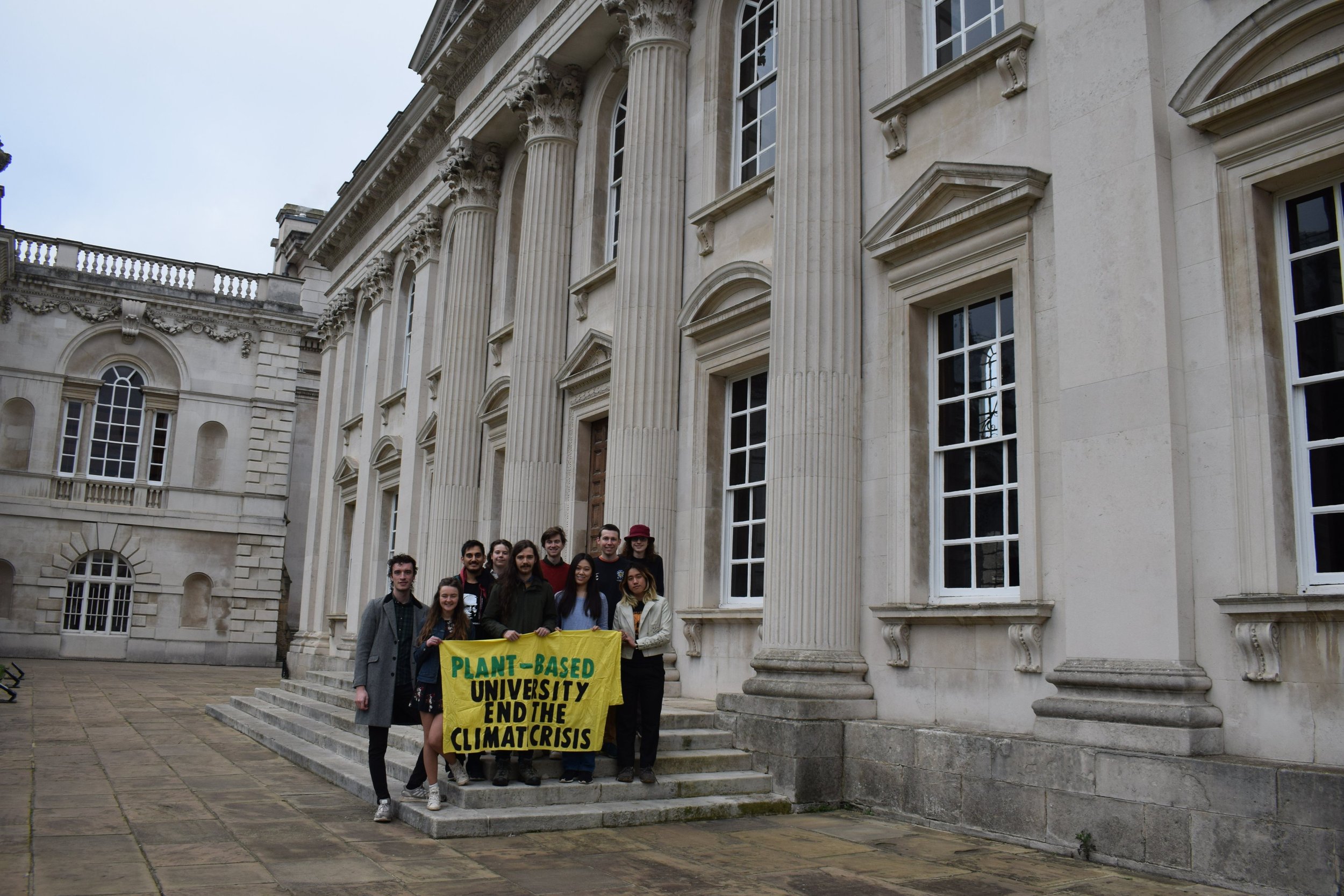Cambridge University Students Vote For 100 Percent Plant-Based Catering
Students at the prestigious university vote in favor of transitioning the campus to 100 percent plant-based catering, in a move to help lower the university’s impact on animals and the planet.
Students from the campaign group Plant-Based Universities Cambridge.
One of the world’s most prestigious universities may soon go vegan after its students voted overwhelmingly in favour of serving only plant-based food.
The Student Union at the University of Cambridge held a vote on whether to initiate talks with the university’s catering services about removing all animal products from its menus. Following a four-week consultation process, 72 percent of non-abstaining student representatives voted in favor of the motion in a final vote held earlier this week.
Student representatives will now work with the university to discuss how its catering services can become fully plant-based.
The motion was proposed by the Cambridge arm of the Plant-Based Universities campaign, which is a nationwide initiative of students who are pushing for their universities and student unions to adopt 100 percent plant-based catering. The group claims that universities have an obligation to follow the scientific research that they produce, detailing the environmental impacts of animal farming and fishing.
“It’s great that Cambridge Students’ Union has passed our motion to work with the University to implement a just and sustainable plant-based catering system,” said William Smith, 24, from Plant-Based Universities Cambridge.
“By removing animal products from its menus, the University could significantly reduce its environmental impact and showcase to the world its commitment to sustainability.”
The motion noted that a fully plant-based global food system could reduce land use for agriculture by 75 percent. This land could then be rewilded to draw down as much carbon dioxide as is currently emitted through fossil fuels each year.
The university has already made progress with replacing animal products with more sustainable plant-based food options, including when it removed beef and lamb from its menus back in 2016.
Considered to be one of the world’s top universities, The University of Cambridge was awarded third place in this year’s list of World University Rankings.
Meanwhile in the U.S., universities are also increasingly offering plant-based food options for students. Aramark, the largest foodservice provider in the country, recently announced its commitment to making nearly half of its food on campuses plant-based. The move will transform the menus at more than 250 colleges and universities across America. “Increasing plant-based proteins, while decreasing animal proteins, is a major factor in helping us reduce food-related emissions and is responsive to changing consumer dietary preferences”, explained Alan Horowitz, VP of Sustainability at Aramark.
Institutions Going Plant-Based For The Planet
As well as universities, councils, and other public institutions are also introducing initiatives to swap animal products for more climate-friendly foods.
Berkeley recently became the first U.S. city to commit to phasing out carbon-intensive meat and dairy products at council-run public events and in city buildings. And some of the world’s biggest companies are also making plant-based pledges: fast-food giant Burger King has predicted that half its menu will be 50 percent plant-based within less than a decade, and has even trialled making plant-based burgers the default option when customers order, as part of its “Normal, or With Meat?” campaign.
The lower carbon-footprint of plant-based food is one of the leading reasons for these initiatives, but there’s also health benefits too: public hospitals in New York City recently launched a healthy-eating initiative which made the plant-based option the default meal served to patients. More than half of all patients chose the plant-based dishes, with the successful initiative continuing to help tackle and raise awareness of diet-related diseases.
We Have A Favor To Ask…
Species Unite amplifies well-researched solutions to some of the most abusive animal industries operating today.
At this crucial moment, with worldwide momentum for change building, it’s vital we share these animal-free solutions with the world - and we need your help.
We’re a nonprofit, and so to keep sharing these solutions, we’re relying on you - with your support, we can continue our essential work in growing a powerful community of animal advocates this year.
More stories:
Species Unite
A collection of stories of those who fight the good fight on behalf of animals.






Evaluating drugs with cutting-edge technology instead of animal testing will improve drug safety and cut development times, the agency said as it reveals a roadmap to increase non-animal research techniques.